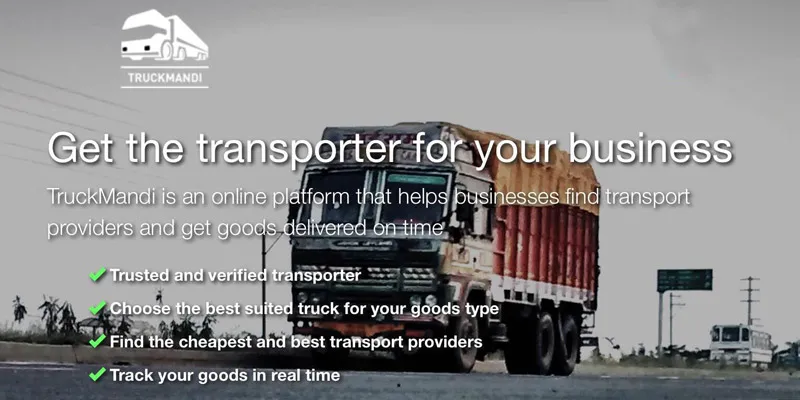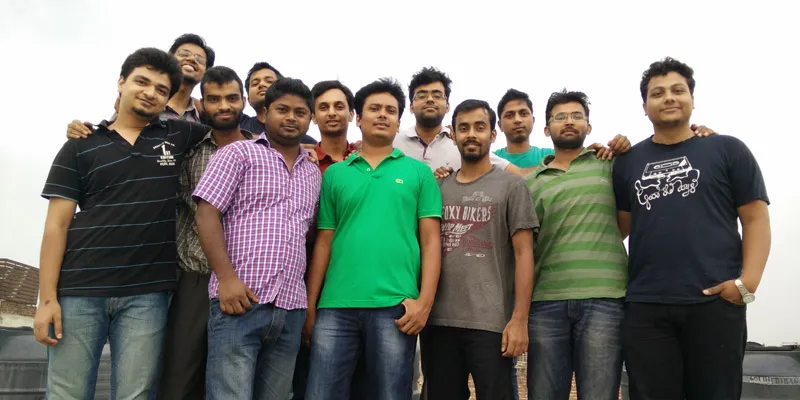IIT alumni start Truckmandi to cut the middle men in logistics sector
With marketplaces for everything from food to spectacles, online shopping is big today. However, looking at a large sector that was still offline and unorganised, Ankit, Anurag and Nishant decided to create Truckmandi. It's a marketplace for trucks, where transporters and vehicle owners can directly connect to businesses and customers who need their services.
Once during a conversation with Amit Saraogi, Chairman CII, Agriculture Eastern, the owner of Anmol Feeds, Ankit discovered that most businesses were plagued with several logistics problems. The middle men, many believed, disconnected them from the market. Irregularities and delays seemed like the common problem faced by many.

Dinner discussions
The three founders were flat-mates, and often had discussions over dinner about the different reasons for this problem, and what the best solutions could be. After researching, they found that logistics was a day-to-day challenge because it involved timely placement and delivery of vehicles, wasted man hours, multiple middle-men and lack of visibility.
All this was, according to them, due to lack of a common platform where customers could connect with service providers. Thus was born the idea of ‘TruckMandi’. It aims to bridge the gap between customers and direct service providers while solving the current market problems and organising the transportation sector.
"We pitched the idea at a TLabs intro pitch session and were selected as part of the batch for their next program, where we got the proper mentorship, guidance of experts and office space to work from," says Ankit. The team began in March. After two months, they are now a team of 20 members, with the national head of ‘Gati’, a cargo distribution company, onboard.
The trio is from varied backgrounds. Ankit, an IIT Kharagpur alumnus, worked at Schlumberger as Field Engineer, and spent one and a half years in the Middle East and Russia. He had another startup, flymyfood and worked at Snapdeal in the product team. Anurag, who has worked as product and analytics manager for Snapdeal and Lenskart, is an IIT Delhi alumnus, and Nishant was working at TCS before TruckMandi happened.

Growth and numbers
The team has a monthly transaction run rate value of one crore, which is growing at the rate of 400 per cent. They are based out of Delhi-NCR, and are operational over routes in Himachal, Punjab, Haryana, UP and Rajasthan. "We currently have 500 partner companies using our technology, and 300 partner transporters/truck owners," adds Ankit.
He says they bring the best rates from verified and reliable transporters/truck owners in the least possible time. Theirs is a marketplace model, completely asset-light, where they engage their vendors in bidding. This ensures the best price from the closest service provider to ensure the fastest availability. "We deploy GPS in all our vehicles, so as to provide complete visibility of transactions," he adds.
The team charges a two percent commission on the transactional value from their vendors. The team recently closed an INR 50 crore deal. "We are focussed on the B2B segment, and our prime target market is SMEs who engage 10-40 trucks a week and transport contractors who deploy 10-50 trucks a day from the spot market," adds Ankit.
According to reports, the logistics market size in India is set to reach INR 48,000 crores by 2019. The 'überization' of everything has touched the logistics space as well. Another similar player in the field, again started by IIT alumni, is The Porter. Apart from this, there is Blowhorn, Loginext and IndiaOnTime in the market that focus on bringing the logistics sector online.
The obstacles
This industry is unorganised and unstructured. Thus, every problem the team saw was the result of five other problems, and all these were interlinked. Major problems included educating the transporter community about the use of technology, ensuring best prices and good quality service from them, complete visibility of transactions, and availability of good drivers.
"Our biggest problem, which we never really considered major, is the pervasive corruption that plagues this industry. In every company we talk to, be it an MNC or a small corporation, everyone involved in the company’s logistics makes some kind of commission through bribes and favours from those to whom they provide the final business. It is very hard to find people and companies who accept this technology as this removes such leakages from the system, but we take this as another challenge and resolve to keep the wheels rolling," adds Ankit.







